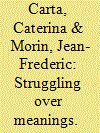|
|
|
Sort Order |
|
|
|
Items / Page
|
|
|
|
|
|
|
| Srl | Item |
| 1 |
ID:
151643


|
|
|
|
|
| Summary/Abstract |
In the field of political theory, few authors have spurred intellectual tirades and triggered collective fantasy as much as the sixteenth-century Florentine Secretary Niccoló Machiavelli. Despite all controversies, in the discipline of International Relations (IR) Machiavelli and his The Prince have been almost exclusively associated with classical realism. This largely unchallenged association contributed to the edification of the myth of The Prince as the ruthless symbol of raison d’état, carrying transcendental lessons about the nature of politics and a set of prescriptions on how helmsmen should behave to seize, maintain, and reinforce their power. The realist hijacking of Machiavelli is at the core of the foundation of classical realism as an IR theory and its location at the very epicentre of IR as a discipline. This appropriation has, in turn, obscured alternative myths of The Prince, which depart from Machiavelli’s reflections on the Principati nuovi to read The Prince as a radical manifesto for political change. The opening of the semantic space in the field of IR – spurred by the so-called interpretive turn – offers an opportunity to break this monochromatic reading. This article delves into two competing myths of The Prince: the classical realist myth and Gramsci’s ‘progressive’ one to demonstrate its contested nature.
|
|
|
|
|
|
|
|
|
|
|
|
|
|
|
|
| 2 |
ID:
174566


|
|
|
|
|
| Summary/Abstract |
The Lisbon Treaty recently celebrated its 10th anniversary. The 2009 legal text was an attempt to enhance the unity, consistency and effectiveness of the EU’s action in an increasingly volatile world. And yet, the post-Lisbon time period has been characterised by multiple crises coming from the West, the East, the South, and even from within the EU. Against this backdrop, our Special Issue makes a systematic assessment of the EU's foreign policy post-Lisbon and of its evolution by focusing on the role of the High Representative of the Union for Foreign Affairs and Security Policy (HR/VP). Assessing the post-Lisbon HR/VPs provides important insights on EU foreign policy processes over the past decade. In this introduction, we discuss the three research questions that guide our collection of articles, as well as our theoretical and empirical contribution to existing scholarly literature.
|
|
|
|
|
|
|
|
|
|
|
|
|
|
|
|
| 3 |
ID:
164453


|
|
|
|
|
| Summary/Abstract |
Discourse analysis offers an extremely diversified landscape, spanning time and disciplines far beyond the field of international relations (IR). With a rich lineage, it comes as no surprise that under the label “Discourse Analysis” (DA) one cannot find a unified theoretical family within IR but rather a plurality of heterogeneous ways of approaching discourse analysis. By leveraging the wealth of discourse analytical works accumulated over more than three decades, this article intends to discuss some of the main theoretical tenets of three competing perspectives on discourse analysis (PDAs): constructivism, critical realism and poststructuralism. It does so by tracing their links to their respective putative philosophical referents. Distinct from Milliken (1999), who consciously stresses the commonalities between various PDAs, this contribution identifies the differences between them. The paper proceeds as follows. First, it locates IR PDAs in the framework of debates over the core branches of the philosophy of social science. Constructivist, poststructuralist and critical realist PDAs will be located along both a foundational/nonfoundational ontological continuum and a positivist/post-positivist epistemological continuum. Secondly, it retraces the main tenets of post-structuralist, constructivist, and critical realist PDAs to discourse by identifying the relevant debates that have characterized the approach to discourse analysis in IR. Finally, it presents some methodological guidelines and provides examples on how DA endeavors have been practiced.
|
|
|
|
|
|
|
|
|
|
|
|
|
|
|
|
| 4 |
ID:
134251


|
|
|
|
|
| Summary/Abstract |
The first section of this article arranges the four theoretical approaches and methods presented in the special issues – namely interpretative constructivism, post-structuralism, discursive institutionalism and critical discourse analysis – along two dimensions: (a) the role of discourse in the constitution of the world, depending on whether approaches perceive social structure as being constitutive of or constituted by discourse; and (b) interpretation of the weight of material and ideational elements in discourses. This model helps to make sense of the profound theoretical diversity that characterises analytical approaches to international relations discourse. The second section tackles the question of ‘who does the speaking’. It identifies the different voices that converge in the EU’s international choir and problematises the discursive environment that forges international discourses through the theoretical lenses of selected approaches. In the last section, the contributions to this special issue are presented.
|
|
|
|
|
|
|
|
|
|
|
|
|
|
|
|
| 5 |
ID:
134254


|
|
|
|
|
| Summary/Abstract |
This article looks at ways in which the EU’s institutional representatives and individual civil servants of the Commission and the European External Action Service frame their discourse on the EU’s international role and values. It proceeds as follows. Firstly, it introduces the data and methodology employed in Discourse Historical Analysis. Secondly, it presents a section to illustrate the metaphors that have been adopted to organise collected material. It identifies three main patterns of discourse-making and associates them with metaphors coming from the Western European literature tradition: two figures coming from Voltaire’s Candide – Candide and Pangloss – and a character from a Mozart opera, Don Giovanni. Finally, the article focuses on perceptions of the EU’s international actions and its core underlying values.
|
|
|
|
|
|
|
|
|
|
|
|
|
|
|
|
|
|
|
|
|